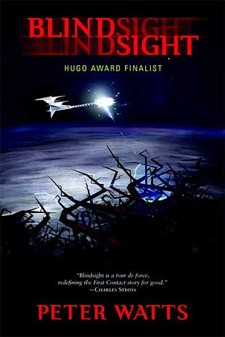It’s my opinion that Peter Watts’s Blindsight is the best hard science fiction novel of the first decade of this millennium—and I say that as someone who remains unconvinced of all the ramifications of its central argument. Watts is one of the crown princes of science fiction’s most difficult subgenre: his work is rigorous, unsentimental, and full of the sort of brilliant little moments of synthesis that make a nerd’s brain light up like a pinball machine. But he’s also a poet—a damned fine writer on a sentence level, who can make you feel the blank Lovecraftian indifference of the sea floor or of interplanetary space with the same ease facility with which he can pen an absolutely breathtaking passage of description. His characters have personalities and depth, and if most of them aren’t very nice people, well, that’s appropriate to the dystopian hellholes they inhabit.
Blindsight is the story of Siri Keaton, a man with half a brain, who is one member of the crew of the research vessel Theseus. The Theseus is crewed by a carefully selected group of technologically engineered superhumans, which—quite by accident—encounters alien life in a vessel they name Rorschach. An alien life that cannot even be described as malevolent, for it is as indifferent to humanity as everything else in the universe, except for humanity itself. An alien life form that is better than us in all imaginable ways, because it is not handicapped with this thing we call consciousness—self-awareness, the I, the ability to observe and question our own actions.
Watts’s universe is capricious, agencyless, and coldly mechanical. He takes a rigorously behaviorist stance on human neurology. His people are ticking clockworks—beautiful, strong, wounded, heroic ticking clockworks, with that perception familiar to so many of us of being trapped outside the course of our lives.
I keep returning to those words—Lovecraftian, indifferent—but Blindsight is also a brilliant argument for the inevitability of that indifference. There’s an icy, logical nihilism at this book’s core that Watts never shies away from, that—in fact—he ruthlessly exploits. Horrible things happen for no reason, because he universe is like that, and Watts doesn’t give us the pretense of some higher meaning as a comfort.
In its own way, though, that nihilism itself can be comforting, and this is the place where I quibble. If it’s all futile, we’re excused from trying. And not trying is so much easier than trying-and-failing, it’s soothing to have an excuse.
The funny thing is, that quibble does not detract from my assessment of this book as among the best of its kind. The fact that I find Watts’s argument insufficiently nuanced doesn’t actually change the fact that he makes it brilliantly, that his ideas are horrible and fascinating and glitter like a swarm of darkly jeweled beetle carapaces, that he’s got a hard-biology explanation for vampirism and that his thematic freight—that all we see when we look out at the universe is our own selves reflected, because that is what we are programmed to see, and that our conscious minds may very well be bad for us—is gorgeously developed.
Blindsight is one of those rare books that alters the reader’s perception of the world and of himself, if the reader is brave enough to tackle it head-on. The idea that consciousness is self-destructive is a heady one. I can think of exactly one other novel that even has the guts to take that one on: it’s Kurt Vonnegut’s much-maligned Galapagos. But where Galapagos is a farce, Blindsight is a tour de force, a science fiction novel that should be able to make any alert reader question not only what just happened in the pages, but exactly who is reading them.
Blindsight is also available to read through Peter Watts’s website.
Elizabeth Bear is the two-time Hugo-winning author of Grail, The Sea thy Mistress, and a bunch of other things.
Return to the Tor.com Best SFF Novel of the Decade Readers’ Poll index.










